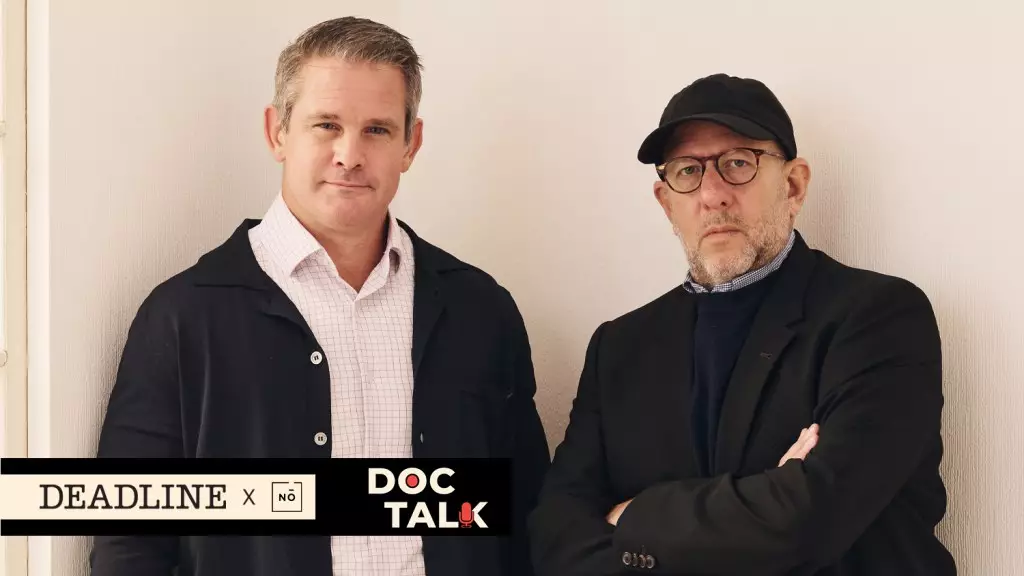In the realm of modern politics, the narrative of Adam Kinzinger serves as a stark reminder of the emotional and physical toll that comes with standing up for one’s principles. Once a promising figure within the Republican Party, Kinzinger became a lightning rod for controversy after his decision to join the January 6th select committee investigating the insurrection at the United States Capitol. This act of courage has not only isolated him from many of his former allies but has also placed him and his family in grave danger, exposing them to a deluge of death threats from fervent supporters of former President Donald Trump.
During a recent interview on Deadline’s Doc Talk podcast, Kinzinger opened up about the repercussions of his principled stand. He highlighted the unsettling reality that his entire family, including his young child, has had to navigate threats that are far from benign. The fallout for Kinzinger extends beyond personal risk; it has reverberated through his family and friends, leading to strained relationships and even hostility from those who once stood by him. Such a burden illustrates the psychological and emotional toll that activism can extract, raising questions about the price of integrity in the current political landscape.
Transformations and Regrets
The interview provided a platform for Kinzinger to reflect on his journey from a reputable GOP representative to what many might consider a political pariah. This transformation is explored in the documentary “The Last Republican,” directed by Steve Pink. The film artfully chronicles Kinzinger’s evolution and his struggle as a leader unwilling to conform to the increasingly radical ethos of his party. He admits, with poignant clarity, that his biggest regret following the events of January 6th is not having the foresight or influence to spearhead a shift within the Republican Party—a “coup” that could have redirected the party’s trajectory towards a more traditional conservativism.
The significance of Kinzinger’s story lies not just in his personal sacrifice, but in the broader implications for American democracy. His narrative sheds light on the internal conflicts many politicians face—whether to prioritize party loyalty or adhere to a moral compass. As the United States grapples with political polarization, Kinzinger’s experience encapsulates the loneliness and isolation that come with dissent.
A Cultural Convergence at TIFF
Kinzinger’s reflections came during the Toronto International Film Festival (TIFF), a hub of artistic expression and societal commentary. It’s interesting to note that amidst Kinzinger’s political discourse, the festival showcased a diverse array of documentaries and discussions that emphasized the importance of storytelling in shaping public consciousness. Notable figures, such as Nobel Peace Prize laureate Malala Yousafzai and award-winning director Raoul Peck, participated in panels that explored the intersections of art, activism, and social change.
The festival also featured music-themed documentaries that capture the essence of cultural icons. For instance, discussions surrounding Bruce Springsteen and Paul Anka highlighted music’s power to unite and inspire, contrasting sharply with the divisions that Kinzinger’s story embodies. The juxtaposition of Kinzinger’s journey with the creative expressions presented at TIFF exemplifies the duality of American life today—where art can rise from conflict, yet conflict also permeates the fabric of politics and society.
Adam Kinzinger’s experience underscores a crucial point in contemporary politics: standing up for one’s beliefs comes with substantial risks, manifesting as social, familial, and physical threats. His willingness to stand against the current within his party not only highlights his courage but also raises fundamental questions about the moral responsibilities of elected officials. As America continues to navigate tumultuous political waters, Kinzinger’s story serves as a beacon for those who value integrity over convenience, encouraging others to evaluate their positions and the potential consequences of their actions in the face of adversity.
In highlighting the interplay between personal sacrifice and larger societal issues, Kinzinger reminds us that the stakes have never been higher for those willing to speak truth to power.


Leave a Reply